Thousands of retired and active civil servants, public-school teachers and military personnel took to the streets in Taipei yesterday, demanding that the government abstain from targeting them in planned pension reforms.
In the first massive demonstration since President Tsai Ing-wen (蔡英文) took office in May, protesters spilled from Ketagalan Boulevard onto Zhongshan S Road and several other roads blocks away, with the Taipei Police Department estimating that about 117,000 attended, while organizers claimed there were more than 250,000 participants.
The size of the crowd was swelled by an official mobilization by the Chinese Nationalist Party (KMT), with KMT Chairwoman Hung Hsiu-chu (洪秀柱) pledging to “stand with” the protesters.
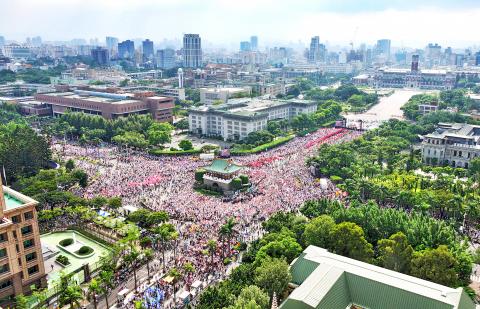
Photo: Lo Pei-der, Taipei Times
While Hung did not take to the stage, she greeted the leaders of one line of former military personnel with flowers and flags, with participants having photographs taken with her.
The KMT also set up several “gas stations” — a play on the Mandarin phrase “add oil,” an expression of encouragement — along march routes, handing out water and Republic of China (ROC) flags.
“Reform absolutely should not be carried out by putting labels on people or pitting generations against each other,” she said, adding that her party had pushed for pension reforms under former president Ma Ying-jeou (馬英九) while the DPP had stalled the efforts in the legislature.
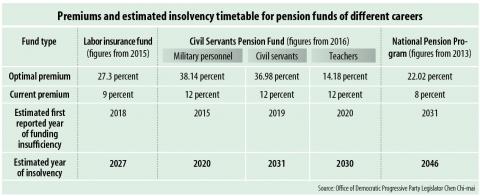
Former premier Hau Pei-tsun (郝柏村) marched in his capacity as a former army general, while several KMT legislators and city councilors also took part.
The demonstration began yesterday afternoon with retired military personnel gathering outside Daan Forest Park (大安森林公園) and National Chiang Kai-shek Memorial Hall before marching to the rally site on Ketagalan Boulevard in front of the Presidential Office Building, walking in formation, waving large ROC flags and singing military anthems.
Retired civil servants, police officers and firefighters gathered at the 228 Peace Memorial Park before walking to Ketagalan Boulevard, while retired public-school teachers converged at National Chiang Kai-shek Memorial Hall’s Liberty Square.
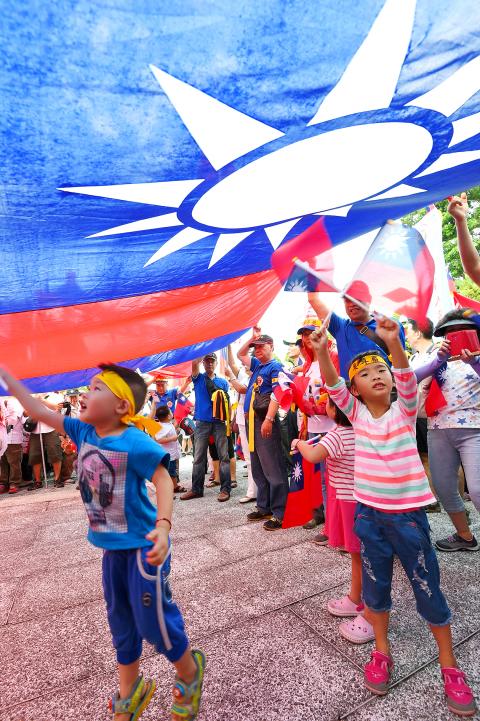
Photo: Chang Chia-ming, Taipei Times
Protesters shouted slogans opposing “stigmatization” and demanding “dignity,” with the Alliance for Monitoring Pension Reform — which organized the march — calling for fiscal reforms and fund management improvements to offset some of the need for cuts, while also demanding that any changes to benefits and contribution formulas not be applied retroactively.
Tsai has asked the Presidential Office’s National Pension Reform Committee to draft a consensus pension reform plan, with Minister Without Portfolio Lin Wan-i (林萬億), the deputy convener and executive director of the committee, pledging to resign if a plan is not drafted and submitted to the Legislative Yuan by May next year.
Some protesters expressed distrust of Tsai’s push for reforms.
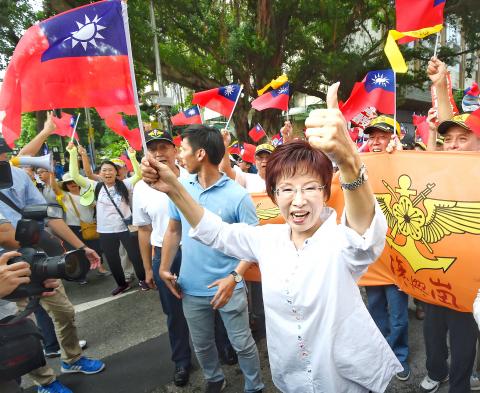
Photo: Fang Pin-chao, Taipei Times
“We are afraid of pension reform, because the Democratic Progressive Party (DPP) is now in full control,” said a woman surnamed Chan (詹), who said she is a former civil servant living in Taichung. “Without the KMT’s participation, there is no way to know what the final plan will look like beforehand. Waiting until a plan is announced would be too late. We have to step forward now before anything is finalized.”
Chan said that the government’s focus on discussions over relative “replacement ratios” between salaries and pensions for public and private-sector employees was unreasonable because of the different nature of the systems.
“We had to go through testing before being hired and that door is always open,” she said. “So if you think we have better treatment, you can always take the test yourself.”
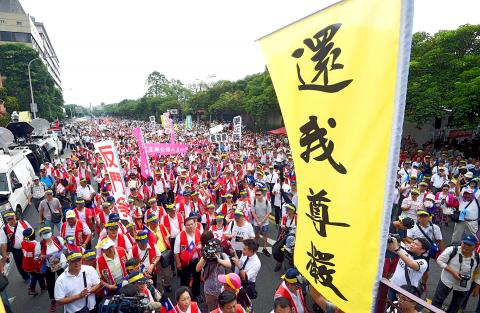
Photo: Lo Pei-der, Taipei Times
“We feel that fiscal reform should be comprehensive and not just targeted at us,” said Kuo Wen-ching (郭文進), a retired soldier, who called for the government to raise taxes on corporations instead of trying to “hunt down” former government employees.
He also rejected remarks by Tsai on Friday that former military personnel had “special circumstances” that warranted their being treated differently as part of pension reform, accusing her of trying to divide former government employees while remaining “coy” about the nature of cuts.
According to the committee, there are 13 pension programs in effect in Taiwan.
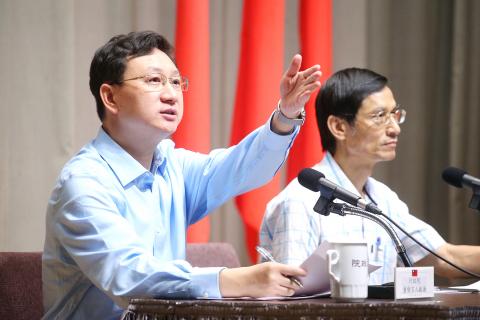
Photo: CNA
The average monthly pension is NT$49,379 for military personnel, NT$56,383 for civil servants, NT$68,025 for public-school teachers, NT$17,223 for private-school teachers, NT$16,179 for employees covered by labor insurance, NT$7,256 for farmers and NT$3,628 for workers covered by general public insurance, it said.
Low contributions coupled with the nation’s aging population have put most of the funds on course for bankruptcy within two decades, with Minister of Civil Service Chou Hung-hsien (周弘憲) last week saying that pension contributions by civil servants, military personnel and teachers would have to be tripled for the funds to be sustainable over the next 50 years at current payment levels.
At a news conference at the Executive Yuan later yesterday, Lin said the committee would convene pension reforms meetings next month and in November across the nation before a national conference in January or February next year.
Additional reporting by CNA

AT RISK: The council reiterated that people should seriously consider the necessity of visiting China, after Beijing passed 22 guidelines to punish ‘die-hard’ separatists The Mainland Affairs Council (MAC) has since Jan. 1 last year received 65 petitions regarding Taiwanese who were interrogated or detained in China, MAC Minister Chiu Chui-cheng (邱垂正) said yesterday. Fifty-two either went missing or had their personal freedoms restricted, with some put in criminal detention, while 13 were interrogated and temporarily detained, he said in a radio interview. On June 21 last year, China announced 22 guidelines to punish “die-hard Taiwanese independence separatists,” allowing Chinese courts to try people in absentia. The guidelines are uncivilized and inhumane, allowing Beijing to seize assets and issue the death penalty, with no regard for potential

STILL COMMITTED: The US opposes any forced change to the ‘status quo’ in the Strait, but also does not seek conflict, US Secretary of State Marco Rubio said US President Donald Trump’s administration released US$5.3 billion in previously frozen foreign aid, including US$870 million in security exemptions for programs in Taiwan, a list of exemptions reviewed by Reuters showed. Trump ordered a 90-day pause on foreign aid shortly after taking office on Jan. 20, halting funding for everything from programs that fight starvation and deadly diseases to providing shelters for millions of displaced people across the globe. US Secretary of State Marco Rubio, who has said that all foreign assistance must align with Trump’s “America First” priorities, issued waivers late last month on military aid to Israel and Egypt, the

‘UNITED FRONT’ FRONTS: Barring contact with Huaqiao and Jinan universities is needed to stop China targeting Taiwanese students, the education minister said Taiwan has blacklisted two Chinese universities from conducting academic exchange programs in the nation after reports that the institutes are arms of Beijing’s United Front Work Department, Minister of Education Cheng Ying-yao (鄭英耀) said in an exclusive interview with the Chinese-language Liberty Times (the Taipei Times’ sister paper) published yesterday. China’s Huaqiao University in Xiamen and Quanzhou, as well as Jinan University in Guangzhou, which have 600 and 1,500 Taiwanese on their rolls respectively, are under direct control of the Chinese government’s political warfare branch, Cheng said, citing reports by national security officials. A comprehensive ban on Taiwanese institutions collaborating or

France’s nuclear-powered aircraft carrier and accompanying warships were in the Philippines yesterday after holding combat drills with Philippine forces in the disputed South China Sea in a show of firepower that would likely antagonize China. The Charles de Gaulle on Friday docked at Subic Bay, a former US naval base northwest of Manila, for a break after more than two months of deployment in the Indo-Pacific region. The French carrier engaged with security allies for contingency readiness and to promote regional security, including with Philippine forces, navy ships and fighter jets. They held anti-submarine warfare drills and aerial combat training on Friday in